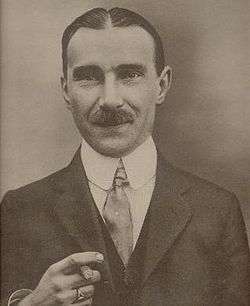Bok de Korver
Johannes Marius ("Bok") de Korver (27 January 1883 in Rotterdam – 22 October 1957 in Rotterdam) was a football player from the Netherlands, who twice won a bronze medal with the Netherlands national football team at the Summer Olympics: in 1908 (London) and in 1912 (Stockholm).
 Bok de Korver | ||
| Medal record | ||
|---|---|---|
| Men's Football | ||
| Olympic Games | ||
| 1908 London | Team Competition | |
| 1912 Stockholm | Team Competition | |
Career
De Korver played for Sparta Rotterdam between 1902 and 1923. He won the Dutch national title five times. De Korver scored his most notable goal in 1912, in a match against AFC Ajax. His goal won Sparta the national title.
De Korver played 31 caps for the Netherlands between 1905 and 1913, scoring one goal. He won two Olympic bronze medals, in 1908 and 1912. De Korver captained the latter team. He was also a player of the Dutch national team that beat England for the first time ever, in 1913.
Legend has it that De Korver never made a foul during his career. He thought training was unsportsmanlike to the opponent, and he loved to smoke cigars. De Korver was the first Dutch football player to be the subject of a biography, in 1916.
Bok de Korver was a civil servant for the municipality of Rotterdam. He ended his career at age 40, after pneumonia. De Korver died on 22 October 1957, aged 74. He was buried in Haren (Groningen).
De Korver was an honorary member of Sparta and of the Royal Dutch Football Association. The football club BDK from Amsterdam was named after De Korver. The west stand of Sparta's stadium, Het Kasteel, was renamed Bok de Korver Stand on 1 April 2007.
Career statistics
International
| Netherlands national team | ||
|---|---|---|
| Year | Apps | Goals |
| 1905 | 2 | 1 |
| 1906 | 2 | 0 |
| 1907 | 1 | 0 |
| 1908 | 6 | 1 |
| 1909 | 3 | 0 |
| 1910 | 4 | 0 |
| 1911 | 3 | 0 |
| 1912 | 6 | 0 |
| 1913 | 4 | 0 |
| Total | 31 | 2 |
References
- (in Dutch) Dutch Olympic Committee